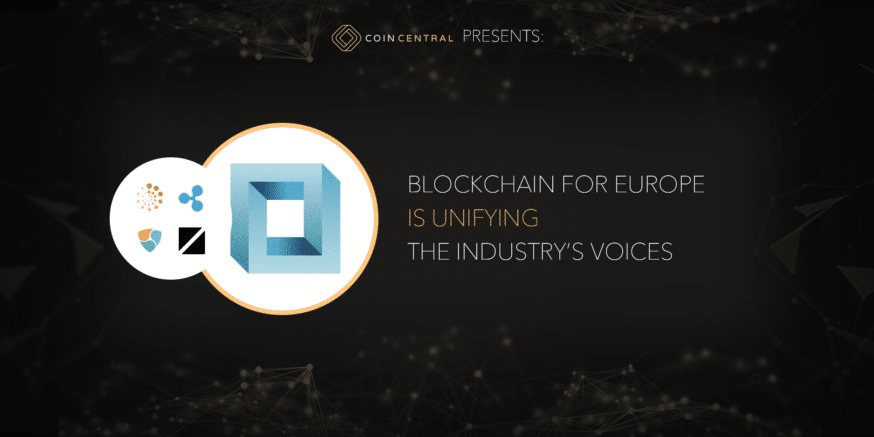What Is Blockchain for Europe?

At the end of 2018, five blockchain heavyweights joined forces to create Blockchain for Europe, an effort “to create a unified voice for the blockchain industry at [the] European level.” The initial committee of Ripple, NEM, Emurgo/Cardano, Bloq, and Fetch. AI hosted a summit in November 2018 in partnership with the four largest European parliamentary groups to discuss an array of topics regarding blockchain, cryptocurrency, and their associated regulations.
As blockchain technology continues to enter the limelight, it’s important that the regulators behind the inevitable legislation understand the ins-and-outs of the technology and what impact their decisions will have on innovation.
CoinCentral’s Steven Buchko and Sarah Rothrie had the opportunity to speak with Kristof Van de Reck, Chairman of Blockchain for Europe and NEM’s Regional Head of Europe, about what’s driving this new organization and some of the challenges that it may face in the coming years.
What are the goals of Blockchain for Europe in 2019?
In 2019, Blockchain for Europe has three priorities:
- Establish ourselves as a trusted stakeholder towards policymakers in the blockchain space;
- Educate EU and member state institutions on the true nature and potential of distributed ledger technology (DLT) and blockchain technologies; and
- Engage in policy discussions, notably around blockchain protocol standards as well as crypto assets. Other topics will follow in the coming years.
Since 2019 is also our first year as an association, an important focus will also be to drive our membership. Our primary constituencies are blockchain originals (i.e. organizations whose prime reason for existence is blockchain).
Describe how discussions with European regulators have been going so far.
The first reactions are very positive. European regulators are generally very open to receiving input from us on this topic. The current stakeholder landscape has been largely dominated by large, non-blockchain originating companies, law firms and universities. We can bring a different perspective to regulators.
In your opinion, which countries are approaching blockchain regulation in an appropriate way?
As of today, France, Malta, Lithuania, Switzerland and Liechtenstein lead the way in Europe on cryptocurrency regulation. Also, the UK is taking steps in the right direction. On blockchain regulation in general, the picture is much more complicated as it often requires an application-based approach and is not necessarily linked to the technology itself.
What do ideal blockchain and cryptocurrency regulations look like to you?
We believe blockchain technology as such should not be regulated. Regulation should be technology-neutral by default. Probably the most important point about dealing with regulation is to bring on board companies developing this new technology so that regulators can better understand its future impact. That is also the mission of Blockchain for Europe.
How can regulators keep up with the pace of blockchain development, particularly in the EU where (by necessity), passing new regulations is a bureaucratic process involving many parties? For example, the GDPR took two years from approval to enforcement. Isn’t there a risk that by the time regulation becomes effective, it’s already obsolete?
We think that regulation should be, to the degree possible, technology-neutral so that technological development is not harmed. Regulation should be based on the applications, not on the technology. Blockchain cannot be regulated with one regulation but requires a nimble, sectoral approach.
What’s your view on the conflict presented to blockchain by the GDPR requiring a “right to be forgotten?” How can blockchain projects ensure compliance?
The EU Data Protection Regulation is certainly a challenge for businesses working with blockchain. In scenarios where users are in control of their own data, like public blockchains, the GDPR is not an issue. However, we have to wonder whether users are actually aware of the consequences of certain actions in this environment.
Blockchain technology, in combination with cryptography, actually provides huge opportunities for privacy. And we can imagine scenarios where the GDPR may be a little strict. There will hopefully be opportunities to improve the GDPR in the future.
Are there any areas where you see blockchain adoption is gaining particular traction in the EU? For example, the My Health My Data initiative seems to indicate a particular enthusiasm for implementing blockchain in healthcare. How does the association intend to represent blockchain adoption in different sectors?
Europe is really keen on becoming a leader in the blockchain space. We see blockchain quickly gaining ground in governance applications, including identity, research cooperation between universities and in the logistics/supply chain area.
While our goal in 2019 is to educate policymakers about blockchain protocol standards as well as crypto assets, in the coming years, we also want to focus on other sectors. Our members are keen to get involved in the discussions around notably digital identity and smart contracts.
[thrive_leads id=’5219′]
There will be a new European Parliament elected in 2019. Do you think this will affect the tone or direction of the blockchain/cryptocurrency policy debate?
There is certainly a risk that the tone of the blockchain/cryptocurrency policy debate will change after the May 2019 European elections. Not only will we likely lose all British MEPs, generally a pro free-market force, we also expect the Parliament to become much more fragmented. While today it is quite easy for us to have a direct impact on the debate through a few members of Parliament that have a real interest in the topic, in a future Parliament, this might become much more challenging. Depending on how the balance of powers shifts, the Parliament might also take a more or less restrictive approach toward regulating blockchain technology.
Does the association intend to get involved in European cross-technology initiatives such as the Smart Cities Initiative?
No, at this stage it is not a priority for us.
Thank you, Kristof and the rest of Blockchain for Europe, for your time and efforts toward further blockchain adoption.
Never Miss Another Opportunity! Get hand selected news & info from our Crypto Experts so you can make educated, informed decisions that directly affect your crypto profits. Subscribe to CoinCentral free newsletter now.











